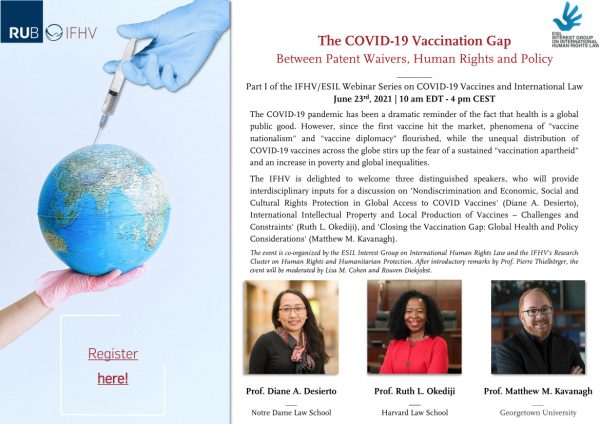Livestream: The COVID-19 Vaccination Gap, Human Rights, and Patent Waivers
Panel I of the Webinar Series on COVID-19 Vaccinations and International Law

The COVID-19 pandemic has dominated political, academic, and societal debates for the past one and a half years and been a dramatic reminder of the fact that health is a global public good. However, since the first vaccine hit the market in late 2020, phenomena of “vaccine nationalism” and “vaccine diplomacy” flourished, while the unequal distribution of COVID-19 vaccines across the globe stirs up the fear of a sustained “vaccination apartheid” and an increase in poverty and global inequalities. The introduction of the first vaccines brought up new ethical, political, and legal dilemmas: How should vaccines be distributed? Is there a right to access to a vaccination and how can the so-called ‘vaccination gap’ be closed?
The “COVID-19 Vaccinations and International Law” Webinar Series aims to discuss these and other questions. The Webinar Series is organized by the Research Cluster on Human Rights and Humanitarian Protection of the Institute for International Law of Peace and Armed Conflict (IFHV) in cooperation with the ESIL Interest Group on International Human Rights Law.
The first panel on “The COVID-19 Vaccination Gap: Between Patent Waivers, Human Rights and Policy” takes place on June 23rd, 2021, at 4 pm CEST (10 am EDT). The panel will feature presentations by Diane A. Desierto (Notre Dame Law School) on ‘Nondiscrimination and Economic, Social and Cultural Rights Protection in Global Access to COVID Vaccines’, Ruth L. Okediji (Harvard Law School) on ‘International Intellectual Property and Local Production of Vaccines – Challenges and Constraints’, and Matthew M. Kavanagh (Georgetown University) on ‘Closing the Vaccination Gap: Global Health and Policy Considerations’ and will leave room for an engaged discussion with the audience. For registration, click here.
Panelists:
- Prof. Diane A. Desierto, Professor of Law and Global Affairs and LLM Faculty Director at Notre Dame Law School, jointly appointed to the Keough School of Global Affairs at the University of Notre Dame.
- Prof. Ruth L. Okediji, Jeremiah Smith Jr. Professor of Law at Harvard Law School and Co-Director of the Berkman Klein Center for Internet and Society at Harvard University.
- Prof. Matthew M. Kavanagh, Assistant Professor of Global Health and Visiting Professor of Law at Georgetown University, Director of the Global Health Policy & Politics Initiative at the O’Neill Institute for National and Global Health Law.


Rouven Diekjobst, MJur (Oxon.) is a PhD student and Research Associate at Ruhr-University Bochum’s Institute for International Law of Peace and Armed Conflict.

Diane is a Professor of Law and Global Affairs at the University of Notre Dame School of Law and Faculty Director of the LL.M. program in Human Rights.

Ruth is the Jeremiah Smith Jr. Professor of Law at Harvard Law School and Co-Director of the Berkman Klein Center for Internet and Society at Harvard University.

Matthew is an Assistant Professor of Global Health and Visiting Professor of Law at Georgetown University, Director of the Global Health Policy & Politics Initiative at the O’Neill Institute for National and Global Health Law.

We apologize that the livestream is currently not displayed above. You may find the livestream here: https://vimeo.com/566588483